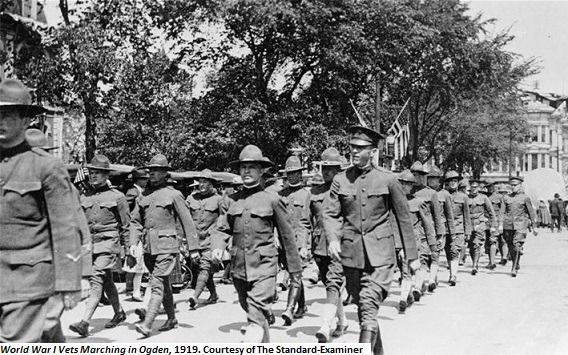Dublin Core
Title
Description
Utah sent thousands of infantrymen into World War I where they faced unimaginable conditions on the battlefield. But when the war ended, the battle continued at home, where returning soldiers faced a changing economy, uncertain job prospects, and a fight for benefits.
In September of 1918, Corporal George Augustus Faust found himself fighting for his life in the Argonne Forest in northeastern France. Known as Gus to his friends and family in Utah’s Millard County, Faust had joined the U.S. Army in May and been posted to a machine gun battalion that saw fierce action against the German Army.
Far from home, Faust was part of the giant Meuse-Argonne offensive that meant to drive the Germans out of France. The going was tough. Faust later recalled that, “The heavy artillery was pounding us, rifles were spitting, machine guns popping, [and] snipers were picking our men off.” German airplanes strafed the unit with a “veritable hail of death,” and a deadly gas attack choked the soldiers. Fortunately for Faust, as well as others who survived, the War ended a month later.
But when soldiers came home, many struggled to find stable jobs. Utah veterans returned to find that farming and mining jobs were vanishing, and that poor prospects in rural areas were driving workers into the cities, or out of the state. The War had left many soldiers with life-long disabilities that prevented them from finding work. But the federal government offered poor compensation for these newly unemployed soldiers and strung out their benefit payments for years. The attitude of U.S. President Calvin Coolidge was that, “patriotism… bought and paid for is not patriotism.”
Dissatisfied over long-term payouts for their military service and suffering high rates of unemployment, many veterans joined the newly-founded American Legion to pressure the government to support returned soldiers. Still others formed the Bonus Army and marched in protest on Washington D.C. in 1932 to secure what the government had long owed them.
As for Gus Faust, he was luckier than most to find stable employment after the War. And as Commander of his local chapter of the American Legion for Disabled Veterans, Faust continued to work with his fellow soldiers to gain protections and benefits for Utah veterans.
Creator
Mikee Ferran and Brandon Johnson for Utah Humanities © 2017
Source
Image: WWI Troops Marching in Ogden, 1919. Utah sent many soldiers to World War I. When veterans returned home, finding reliable work was challenging. Courtesy of the Standard-Examiner.
________________
See Millard County Chronicle, June 26, 1919, p 5; Millard County Chronicle, September 8, 1921, p 8; Salt Lake Telegram, August 22, 1925, p 2; Brandon Johnson, “A Perfect Hell: Utah Doughboys in the Meuse-Argonne Offensive, 1918”, Utah Historical Quarterly (vol. 80 no. 4) 2012, pg. 334-363; for more information on veteran’s benefits see PBS “Veterans of Foreign Wars” and PBS NOW: Veterans Benefit History; for more information on Utah and World War I see Utah History to Go “From War to War”, “World War I and Utah”, and “The Twenties”.

